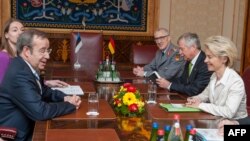Germany's defense minister said on Tuesday that nobody should underestimate NATO's rapid response capacity, which has been ratcheted up in response to worries about Russia's military ambitions after its actions in Ukraine.
Germany's Ursula von der Leyen said in Russia's neighbor Estonia, whose president fears the Baltic state could be overrun in hours, that the Western military alliance has demonstrated its determination to defend its eastern flank in recent months.
“Of course the issue of speed and of an adequate response to potential threats plays a major role and I can only recommend that NATO's reaction capacity should not be underestimated. It is high,” she told reporters in Tallinn.
“We have shown the necessary adaptability and this is also a reaction to fast exercises we have seen on the other side of the border,” she said, citing plans to boost defenses and build out a new NATO “spearhead” rapid reaction force of 5,000 soldiers.
‘It's over in four hours’
Von der Leyen was responding to a question about Estonian President Toomas Hendrik Ilves' comments that while it would take NATO up to a week to deploy to the Baltics, “our neighbor” has shown in exercises that its strike speed is “basically instantaneous”.
“They're here and it's over in four hours,” Ilves told the British newspaper The Telegraph in an interview published over the weekend.
NATO, surprised by the speed of Russia's military intervention in Ukraine's Crimean peninsula last year, has decided to speed up the response time of its rapid reaction forces.
Its “spearhead” force is unlikely to be fully operational until 2016 or 2017 but NATO has been focusing on its existing reaction force, whose troops are supplied this year by Germany, the Netherlands and Norway.
Some of NATO's eastern European allies are disappointed at the U.S.-dominated organization's reluctance to station large numbers of troops on their territory.
Russian drills
Meanwhile, Russian navy vessels entered the English Channel on Tuesday on their way to the northern Atlantic for anti-aircraft and anti-submarine defense drills, the Northern Fleet said.
The squadron, led by the Severomorsk anti-submarine ship, had carried out drills in the Bay of Biscay and will later head for the northeastern Atlantic, a spokesman for the Northern Fleet said in a statement.
Russia's Interfax news agency had reported that the squadron would hold drills in the English Channel but the fleet's statement did not confirm this.
It is not unusual to have Russian warships in the Channel. NATO dismissed in November a Russian media report that a squadron of Russian warships had conducted military exercises there.
Relations between Russia and the West have sunk to post-Cold War lows since the start of the crisis in Ukraine.











